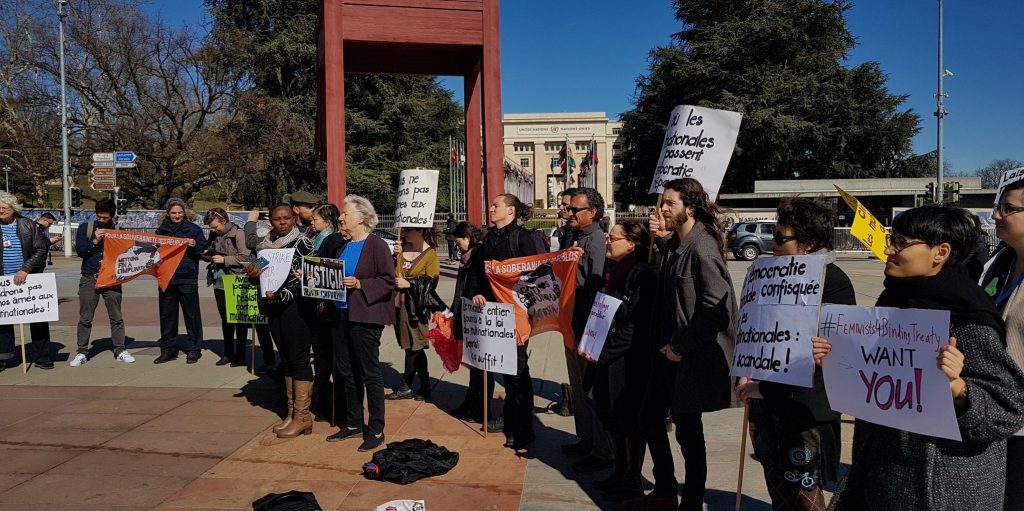Last week, 94 countries negotiated at the UN in Geneva the draft text for a binding treaty on business and human rights. The aim of this treaty is to stop human rights violations by transnational corporations and to give victims globally fair access to justice. You would expect the European Union (EU) to play a leading role in this process – but the EU and member states chose to remain silent.
While other countries and experts were actively engaging in negotiations on legal instruments to stop corporate impunity, the only occasions the EU took the floor were for negative comments on the process. Eventually, the EU even dissociated itself from the unanimously adopted conclusions, leaving future participation in the process undecided.
Why does the EU refuse to engage in this historic process to protect human rights?
The Ecuadorian ambassador Luis Gallegos who was chairing this negotiation round explained the non-cooperative behaviour of the EU as follows: ‘If you are at the table and you are not eating, you are probably on the menu’. A not so subtle hint: this treaty will definitely force European transnational corporations to change their operating practices.
Many member states of the European Union are the home country of multinationals that make huge profits while committing grave human rights violations, for instance through land grabbing and environmental pollution. The binding treaty would force these corporations to increase their due diligence activities and improve operating standards. And it would give victims of Shell, Unilever, ENI and the like access to courts in the European home countries of these companies. A big risk for these mega-corporations – financially, but also in terms of public image.
Take for example the French-Belgian energy company Engie that in 2007 started constructing the Jirau dam in Brazil. Indigenous communities were displaced without their consent during the construction of this dam but couldn’t get access to justice in Brazil. With a UN treaty they would be able to go to a Belgian or French court and claim compensation for the loss of land directly at Engie’s headquarters.
Or take Shell, the Anglo-Dutch fossil fuel multinational. For decades Shell has been polluting the Niger delta destroying the livelihoods of farmers and fishermen. A UN binding treaty on business and human rights would give affected communities from Nigeria direct access to the Dutch court. They would have a good chance of getting compensated for the billions of euros of damage caused by Shell, and could force the company to clean up. It is beyond question that Shell wants to prevent this at any cost.
It is exactly these kinds of companies that the EU and its member states want to protect by playing an obstructive role in the treaty negotiations. The EU wants to avoid legally binding obligations that entitle victims of corporate abuses to hold European companies accountable in their home countries.
European businesses want to stop this treaty. But what’s more important: profits or human rights?
The priority for industry became very clear during last week’s negotiations: they intend to avoid a treaty at any costs. The International Organisation of Employers, also representing European business, published a highly controversial report in which it openly confronts countries which are currently cheerleeders of the treaty with its threatening figures on economic impacts. ‘States that support this process should take note that they too risk significant adverse impacts if this treaty ever comes into being’, concludes the report, followed by a series of graphs depicting ‘Exports at risk from treaty ratification’ for countries like Ecuador and South Africa.
The EU is less vocal about which side it chooses. The official reasons to not participate in the negotiations are mainly procedural objections. It seems that the EU is criticising the rules of the game to avoid the real discussion on how to protect people from human rights violations by its corporations.
Unofficially the EU clearly sides with business. When it comes to trade and investment agreements, the EU is a frontrunner in giving privileges to business and it doesn’t criticise the process or stay silent. The EU offers business legally binding rights and strong enforcement mechanisms, while victims of corporate crimes only get voluntary guidelines without strong sanctions and enforcement.
Last Friday, when the UN treaty negotiations where being finalised without the EU participating, the same institution signed an investment treaty with Singapore, entitling companies to bring governments to investment courts when their profits are being harmed by regulation. This shows how the EU is clearly prioritising VIP rights for corporations over justice for victims of human rights violations.
Two-thirds of the richest 100 entities on the planet are corporations, according to a recent study by Global Justice Now. In this globalised world corporations are becoming more and more powerful and the international legal system is not designed to counterbalance this power. That’s why we need our national governments and the EU to support a binding treaty on business and human rights and to actively engage in the UN process.
By remaining silent the EU and its member states are putting profit over people and choosing sides with business. We as Europeans citizens demand that our governments prioritise the rights of victims of human rights violations over those of the companies involved in these abuses.







